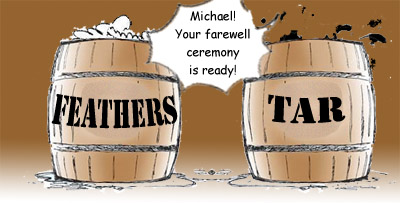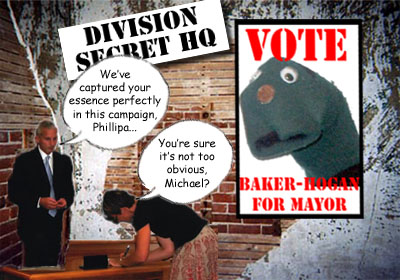Shock poll results

Well actually they're not. Shocking, that is. They might be if they were about anyone else, but not when the topic is Michael Laws. Because the Diva has a long but hardly proud tradition of polarising people, and that's illustrated in the results of the latest LawsWatch poll.
We asked "Has Michael Laws' popularity increased or decreased since he was elected?". 151 people voted. Some people possibly voted more than once, if they went to a bit of trouble to defeat the fairly rudimentary multiple voting protections in place at Pollhost. But overall, we got pretty much the result we were expecting:
Increased by 50% or more: 15%
Increased by 25% - %50%: 1%
Increased by 20% - 25%: 1%
Increased by 15% - 20%: 2%
Increased by 10% - 15%: 7%
Increased by 5% - 10%: 2%
Increased by up to 5%: 1%
Remained static: 3%
Decreased by up to 5%: 7%
Decreased by 5% - 10%: 7%
Decreased by 10% - 15%: 10%
Decreased by 15% - 20%: 9%
Decreased by 20% - 25%: 9%
Decreased by 25% - 50%: 19%
Decreased by 50% or more: 7%
So 101 voters thought his popularity had decreased, with by far the largest number estimating it at a drop of 25 to 50 percent. Another 45 thought it had increased, with by far the greatest number estimating that increase at over 50%.
We'd project that no matter how high the numbers went, we'd still have a sort of inverse bell curve, with peaks at either end of the two extremes.
The inescapable conclusion? During a short time as Mayor Michael Laws has managed to make fanatically loyal converts out of some people and mortal enemies out of somewhat more. Indeed only five people thought his support had remained static.
So what's going on in Wanganui? We're sure there'll be people who'll ascribe the most noble and well-thought-out motives to their fellow citizens: having followed the debate about skyrocketing costs and read one too many incendiary rant, they've considered their opinion over their breakfast marmalade and morning paper and reached a careful conclusion.
Not quite. We'd posit that Mickey is becoming the victim of that very phenomenon that gets populists elected and helps them pass Mickey Mouse referenda. It's what Professor of Political Science at the University of California Samuel L Popkin calls "low information rationality" and which he outlines in his book "The Reasoning Voter":
Voters are thus not particularly well informed about the details of public policy and government activities. Everybody's business is nobody's business...In other words, people often don't take a lot of trouble to analyse issues in depth. Instead they process lots of snippets of information gleaned from the media, from politicians, and - most importantly - from one another, and vote based on gut instinct.
...voting is a form of collective action; elections are won only when enough people vote totgether. Voters focus not only on their own concerns and preferences but on those of others as well. Therefore, in deciding which issues to focus on and which candidates to vote for, voters will be affected by information about what other voters are doing. Information about the preferences and votes of others will help them decide whether there are enough people with the same concerns or preferences to make a critical mass...
A politician is promising to deliver a future product about which the voter may have limited understanding, so the vote involves uncertainty about whether the product can be delivered, and, if so, whether it will perform as promised... To deliver the promised benefits, a politician mst do more than attract enough votes; he or she must attract the support of other politicians as well. For this reason, voters consider not only the personal characterisitics of their candidate, but also the other politicians with whom he or she is affiliated...
The term low information rationality - popularly known as "gut" reasoning - best describes the kind of practical thinking about government and politics in which people actually engage. It is a method of combining, in an economical way, learning and information from past experiences, daily life, the media, and political campaigns.
Bang a populist drum, produce some glossy brochures, hobble an already toothless media, and you're two thirds of the way there. But what's happening in Wanganui is that people are talking. And others are listening. And that buzz isn't complementary of Mickey's first (and seemingly only) term as Mayor. Even those voters who operate on low information rationality are getting the information they need to draw a more balanced conclusion about the last year and a bit.
It's not that the anti-Laws activists have succeeded in making their case - they haven't. Partly because the mainstream media haven't given them a fair hearing (and indeed have provided the Mayor with a pedestal from which to abuse them) but mostly because they've been too fractured to form a cohesive opposition.
No, it's the ill-informed voter who's beginning to turn, as Mickey found out when he did his own poll. They weren't entirely sure why they liked him. They'd talk in images of "change" and "shaking things up" and "a well known name", not policy. And they're not entirely sure why they've grown not to like him - they just don't like what they've heard around the place, and their support is rapidly waning.
And Mickey, ever fleet of foot, is one step ahead of them again.
Comments on this post are now closed.



